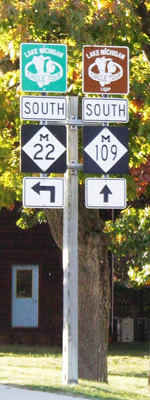The Zilwaukee Bridge: From the Beginning
The following pages reproduce a 1987 report issued by the Michigan Department of Transportation in response to public concerns about the safety of the Zilwaukee Bridge, then nearing completion. The text here is reproduced word-for-word from the original report and no alterations—grammatical or otherwise—have been made. |
TERMINATING THE CONTRACT
Negotiations with the contractor to allow work to resume on the bridge began in early 1983. It was the first major task undertaken by James P. Pitz following his appointment as the director of the Michigan Department of Transportation by newly imaugurated Gov. James J. Blanchard.
In their negotiations, MDOT and the contractor dealt with two basic options. First, Stevin/Toebe and the department could agree to a settlement, clearing the way for the award of a new contract to finish the project. Another more time-consuming and far more expensive option would involve termination of the contract by Stevin/Toebe, to be followed by litigation to settle the differences.
After months of intense negotiations, the two parties arrived at an agreement terminating the contract. The settlement contained three basic elements:
— The contractor agreed to drop all claims against the state, which totaled about $29 million. In return, the contractor received a $4.8 million payment from the state along with a purchase agreement.
— The state, for $8.2 million, aquired all the contractor's equipment, including the erection equipment and the segment fabrication plant. The original purchase price of the plant and equipment was more than $20 million, and it is estimated that MDOT will realize more than $3 million from its sale after the bridge is completed. The agreement enabled the contractor selected to complete the bridge to have full use of the plant and equipment.
— The contractor and MDOT agreed to forego any litigation against each other.
The contractor, at the time of the settlement, had received payments totalling $62 million for work completed. The total included more than $4 million for the higher cost of materials covered under the escalator clause.
Had the failure not occurred, it is estimated that the bridge would have cost $84 million to complete, about $7 million over the bid price.
Next: Section 7: Resuming Construction
Back to: Section 5: Making Repairs
Back to: Table of Contents

